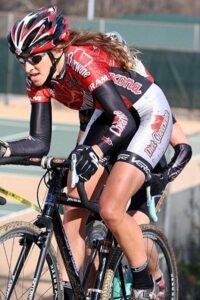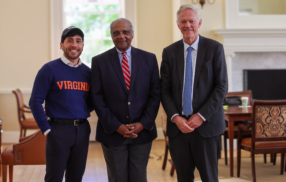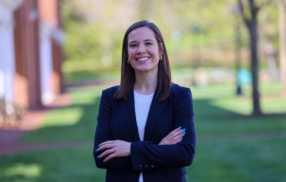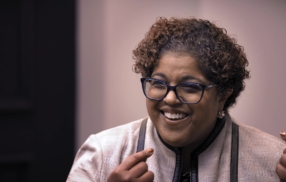
Cycle of Giving: A Road Racer’s Ride to Leadership and Making a Difference at Darden
By David Buie-Moltz
Mandy Lozano (MBA ’09) exemplifies the power of engaged alumni at Darden. Transitioning from professional cycling to corporate leadership and now to active philanthropy, Lozano’s journey is a testament to the influence of Darden’s transformational education experience. As a member of the Darden School Foundation Board of Trustees and the giving chair for her 15th reunion this spring, she embodies the spirit of giving back, showcasing how every graduate can contribute to shaping the School’s future. This conversation reveals her insights on philanthropy, leadership, and the lasting influence of Darden on her path.
What leadership and management lessons did you learn from cycling?
One big aspect is the team dynamic. Cycling might seem like an individual sport, but it’s incredibly team-focused and strategic. There’s a whole lot of planning that goes into it. It’s not just about being the fastest rider; it’s about outsmarting your opponents. You need to assess the field, understand your competitors’ strengths and weaknesses, and strategize accordingly.
My role as a domestique exemplified this perfectly. Essentially, I was the “worker bee” whose job was to support the team, even if it meant sacrificing my own chances of winning. So, whether driving the pace at the front of the pack or chasing down breakaways, I had to constantly adapt and make split-second decisions based on the situation.
Then there’s the aspect of learning from losses. In sports like cycling, you lose way more often than you win. It’s all about taking accountability and figuring out what you can do differently next time.
Rest is another critical factor. People often underestimate the importance of rest and recovery in sports, but it’s just as vital in the workplace. Grinding non-stop isn’t sustainable. You need to give your mind and body the chance to recharge, or you’ll burn out.
Who is a Darden professor who made a significant impact on you?
Luann Lynch, our accounting professor in Section C, was an absolute legend. You’ve probably heard people jokingly refer to her as the one who named her twins Debit and Credit. (I still don’t know their real names!) Anyway, Luann had this knack for making everything click. You’d spend hours puzzling over something, and then suddenly, it would all fall into place. She was relentless in making sure we got it but also incredibly kind. She had this way of gently guiding you when you were almost there, nudging you until it all made sense. She was truly gifted, and I adored her.
One big takeaway from her class was the importance of trusting your instincts. Sure, I’ve become quite analytical and data-driven over the years, but Luann reminded me that instinct plays a crucial role, too. It was those moments when I’d voice my thoughts, and she’d help me piece it all together, even when I was just shy of the mark. And that lesson stuck with me — how to guide someone who’s almost there, how to coax out that last bit of understanding.
What has your professional journey been like since Darden?
I’ve had quite the journey jumping between vastly different industries. Starting with beauty at Burt’s Bees, I knew I wanted to pivot back into marketing and general management. So, I went from beauty to snacks at PepsiCo, then to coffee and retail at Starbucks, then to Nestlé and then to housewares at MiiR, then to molecular science at an ingredients company. But what’s been consistent is my ability to understand and lead in all these different environments.
I attribute a lot of this adaptability to my time at Darden. The case method and the hundreds of cases we tackled during my time there really honed my ability to quickly assess a situation, create mental frameworks and identify the most critical actions to take.
Working with founders has also been particularly enlightening. I’ve had the opportunity to learn from some incredible entrepreneurs like Roxanne Quimby (Burt’s Bees), Howard Schultz (Starbucks), Bryan Papé (MiiR), and most recently, the co-founders of my current startup company (Spoke Sciences). Managing the personalities of founders and channeling their energy is its own art form. They bring this infectious optimism and belief in their vision, which can be incredibly motivating. Sometimes, it pushes the organization further than it ever imagined, and that’s where the magic happens. I may not be the entrepreneur with the big idea, but I’m the one who can take that idea and run with it, scaling it up and making it a reality.
What drives your support for Darden?
Reflecting on my journey, I realize how fortunate I was to have parents who fully supported my undergraduate education without leaving me saddled with debt. However, when it came to Darden, things took a different turn. I ended up accumulating a significant amount of debt, which posed some serious challenges for me after I graduated.
But here’s the thing: the generosity and passion for education that my parents instilled in me stuck with me. It became a driving force behind my desire to pay it forward and help someone else access the opportunities I had, albeit with less financial strain. So, I decided to establish a scholarship at Darden. It was a way for me to honor my parents’ legacy of emphasizing the transformative power of education and to help break down the financial barriers that often stand in the way.
What has motivated you to make a planned gift to Darden?
Well, one thing is that it helps me think about and plan for my legacy. But beyond that, it helps create dialogue.
Over time, I’ve been talking to my sister, her husband, and their kids about my passion for education and animals. It helps to have those conversations and seed philanthropy for those around us. For instance, for Christmas, I ask my niece and nephew to donate something in my name instead of giving me gifts. They’re 12 and 14, and if they think at all about giving back, or giving to those in need, when they think of me, then when it comes to being an Aunt, I’d say I crushed it. Moreover, I’ve decided that when I’m gone, they will have some autonomy over a portion of my estate. I’ll let them decide how to donate it.
All these decisions stemmed from stating my intentions, and the Darden team was instrumental in helping me navigate through it all. They facilitated a constructive conversation, and I realized how simple it was to execute my plans.
Ultimately, it’s not about my ego but about being clear about how much I love my alma mater and how crucial it is to support it financially. Moreover, it’s about realizing that you can positively influence the trajectory of students and of different parts of the School if you’re committed to it, which is a big deal for me.
For more information on planned giving, contact Mary Katherine Barbour, director of strategic gifts, at BarbourM@darden.virginia.edu or +1-434-924-4783.
The University of Virginia Darden School of Business prepares responsible global leaders through unparalleled transformational learning experiences. Darden’s graduate degree programs (MBA, MSBA and Ph.D.) and Executive Education & Lifelong Learning programs offered by the Darden School Foundation set the stage for a lifetime of career advancement and impact. Darden’s top-ranked faculty, renowned for teaching excellence, inspires and shapes modern business leadership worldwide through research, thought leadership and business publishing. Darden has Grounds in Charlottesville, Virginia, and the Washington, D.C., area and a global community that includes 18,000 alumni in 90 countries. Darden was established in 1955 at the University of Virginia, a top public university founded by Thomas Jefferson in 1819 in Charlottesville, Virginia.
Press Contact
Molly Mitchell
Senior Associate Director, Editorial and Media Relations
Darden School of Business
University of Virginia
MitchellM@darden.virginia.edu





